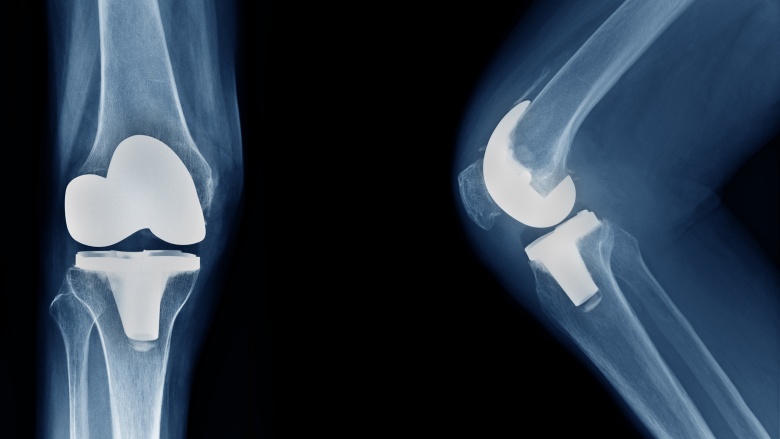What Really Happens To Your Body When You Lose A Lot Of Weight
According to the Centers for Disease Control and Prevention (CDC), more than two-thirds (68.8 percent) of adults are considered to be overweight or obese. In addition to health risks associated with being overweight or obese, it can be costly. The estimated annual medical cost of obesity in the U.S. was $147 billion in 2008. Because of the health risks and associated costs, there has been a push in recent years toward helping children and adults lose weight. Even the First Lady has been spearheading a campaign to help combat childhood obesity.
Most of us know the obvious things that happen when you lose a lot of weight. You'll fit into smaller clothes (and may need a brand new wardrobe because of it). You won't have as many aches and pains. You'll sleep better and you'll have more energy. But how do these things happen? What really happens in your body that makes you feel so much better when you lose a lot of weight?
There will be less strain on your joints
People who lose a lot of weight may find they have fewer aches and pains throughout the day, and this can largely be attributed to their joints. In addition to muscles and ligaments, our joints help hold us up when we stand and move. Many of these joints also support the weight we carry. These weight-bearing joints include the knees, hips, and ankles for primary support. When you carry extra weight, these joints have to offer more support. While everyone experiences wear and tear on their weight-bearing joints over time, those who are overweight or obese experience much more wear and tear over time. This leads to a higher prevalence of not only general joint pain, but also osteoarthritis and joint replacement.
Research has shown that not only will losing weight decrease the chance you'll develop arthritis, losing weight can also help improve your symptoms if you have already been diagnosed with arthritis. A 2005 study found that a weight-loss of just five percent (ten pounds for a woman starting out at 200 pounds) brought about an average 18 percent improvement in osteoarthritis symptoms, including reduced pain and improved joint function. Another study the same year showed that a weight reduction of ten percent (20 pounds in the same 200 pound woman) resulted in a 28 percent improvement in joint function. This suggests that the more weight you lose, the more joint function improvement you will see, whether or not you have been diagnosed with osteoarthritis.
Your lower back pain might go away
An unexpected result of losing a lot of weight could be reduced or eliminated low back pain. Around 26 percent of North Americans experience low back pain at some point every year and about 80 percent of adults experience it at some point in their lifetime. If you've ever been part of that 80 percent, you know how painful, frustrating, and debilitating it can be.
While not everyone who has low back pain can attribute it to weight, the strongest association with seeking care for low back pain and chronic low back pain is among people who are overweight or obese. One way to explain this is because your low back is another weight-bearing area of your body. Excess weight, particularly in the top half of the body, can increase low back strain, leading to an increased risk of pain. By losing a significant amount of weight, the strain that is placed on the low back is reduced, helping to reduce or possibly completely eliminate your back pain.
Your sex life could improve
Have you lost a lot of weight and found that your sex drive has increased? Maybe you're actually enjoying sex more, too? It isn't surprising since researchers have found that weight loss can often lead to significant improvements in body image. It turns out that losing weight can also affect women's sex hormones in a positive way. In overweight women, elevated levels of free testosterone as well as decreased levels of sex hormone-binding globulin can lead to sexual dysfunction. Researchers have observed that with weight loss, these hormone levels are restored to normal functioning. Once hormone levels return to normal functioning, the women reported increased arousal, desires, and satisfaction related to sex after weight loss. This means not only are women experiencing a higher sex drive after they lose a lot of weight, the sex is better.
Your risk for breast cancer decreases
About 1 in 8 women in the United States will develop invasive breast cancer over the course of her lifetime. While obesity has been linked to breast cancer, losing weight can decrease that risk. Free testosterone and sex hormone-binding globulin aren't the only hormones impacted by significant weight loss. After menopause, fat is the primary storage location for estrogen. This means that the more fatty tissue a woman has, the more estrogen may be stored. While more estrogen is equated with more body fat at all ages, this is particularly true after menopause. This is important because high estrogen and androgen levels have been linked to an increased risk for breast cancer. In fact, studies have shown that weight gain in early adulthood leads to an increased risk of breast cancer after menopause.
Does that mean if you were overweight in early adulthood there's nothing you can do about your risk for breast cancer after menopause? Not exactly. Scientists who worked on the original study then took the research a step further and found that losing weight after menopause actually decreases breast cancer risk in postmenopausal women. You may be wondering what you can do now to decrease your breast cancer risk if you haven't gone through menopause. More recent research suggests that losing weight prior to menopause can also reduce the risk of postmenopausal breast cancer. By losing weight now, you are already reducing your risk of getting breast cancer later in life.
Your breathing will improve
If you've lost a lot of weight and notice you don't feel as winded anymore, it may not just be because you're more physically fit than when you were overweight. Breathing and lung function are related to weight in several ways. In obese individuals, adipose tissue (fat) around the rib cage, lungs, and in the abdomen can reduce the overall functional capacity of the lungs, making it harder on the body to take in and absorb oxygen. This also means that when you lose weight and decrease the fat surrounding your rib cage and lungs, breathing will get easier in your everyday life.
Another aspect of breathing that is impacted by being overweight or obese is asthma. While asthma exists in both overweight and normal weight individuals, it can be exacerbated by obesity and this decreased functioning of the lungs. According to research, weight loss in doctor-diagnosed asthma patients leads to the remission of asthma and the use of asthma medications in 48-100 percent of cases. The variability in these cases needs to be explored further, but may be attributed to the amount of weight lost and environmental factors like living in a city (with higher pollution) versus living in a rural area. This means whether you have a diagnosed breathing condition or not, losing a lot of weight can help you breathe easier.
You'll sleep better
Have you ever woken up in the morning and felt like you didn't sleep at all the night before? Obstructive sleep apnea, which causes breathing to repeatedly stop during sleep, is highly linked to obesity. Roughly 70 percent of patients with obstructive sleep apnea are also obese. In addition to the reduced lung function discussed previously, researchers suggest that the high incidence of sleep apnea in obese individuals may be because airway size is reduced by excess fat in the neck. This fat puts pressure on the airway when a person is lying flat. While there are other risk factors for obstructive sleep apnea, it is important to note that weight is the only major risk factor that is reversible (other risk factors include age, gender, and race). People with obstructive sleep apnea often feel tired throughout the day because their sleep is disrupted throughout the night. By losing weight and reducing the risk of sleep apnea, you'll get a better night's sleep.
You'll also sleep better if one of the methods you employ to lose weight is regular exercise. Research has shown that people who exercise at least 150 minutes per week sleep better and feel more alert during the day than those who don't exercise regularly. There are more advantages to sweating it out at the gym than fitting into your skinny jeans.
It may be easier to get pregnant
For many women, getting pregnant can be difficult. This may be particularly true for women who are overweight or obese. Obesity has been linked to irregular periods, reduced fertility, and increased risk of miscarriage through a variety of complex systems. According to research, obesity impacts multiple stages of pregnancy including the availability of viable eggs, the chance of fertilization, and the development of the embryo.
The good news is that losing weight can improve hormonal profiles, regularity of periods, ovulation, and pregnancy rates in overweight women trying to conceive. While this is great news, sometimes fertility issues may be caused by another underlying issue. It turns out these too can be exacerbated by being overweight. For example, obesity can worsen the symptoms of Polycystic Ovary Syndrome (PCOS), which is related to infertility. Compared with normal weight women with PCOS, overweight and obese women with PCOS have more problems with their periods, ovulation, and pregnancy rates in general. When overweight or obese women with PCOS lose weight, their fertility outcomes are improved. In fact, weight loss in obese infertile women seeking any type of fertility treatment leads to improved outcome. This means even if weight loss alone doesn't lead to an easier conception and pregnancy, it still improves fertility overall, which makes any additional fertility treatments more effective. For this reason, women who are seeking fertility treatments due to difficulty conceiving are often first advised to lose weight.
You'll need fewer medications
The routine of a person who is overweight or obese may begin first thing in the morning with a series of medications. Obesity has been linked to high blood pressure, cardiovascular disease, type-2 diabetes, some cancers, and osteoarthritis, among many other health concerns. Not only are these weight-related health concerns potentially life-threatening, they can be expensive, especially for those taking daily medication to combat the problems.
Research has consistently shown that losing weight can completely reverse type-2 diabetes as well as lower blood pressure, meaning that patients can stop taking costly, daily medications. While more research needs to be conducted on the impact of weight loss on other diseases, the decreased risk factors for disease after weight loss can mean living a longer life — possibly medication-free.
Your memory may improve
Are you feeling like your brain is just a little bit sharper now that you've lost weight? You aren't alone. In 2006, researchers found that not only is obesity linked to memory deficits in older adults, it is also linked with memory deficits in young and middle-aged adults. To take their research a step further, researchers completed another study published in 2011 to see if weight loss might improve memory. Turns out, it did. The researchers compared a group of obese individuals who were undergoing bariatric surgery with a group of obese individuals who were not. Those who underwent bariatric surgery for weight loss showed improved memory performance at 12 weeks after their surgery, while the control group (those who did not receive surgery) did not display improved performance. While research is lacking on the effect of non-surgical weight loss on memory, the link between obesity and memory deficits suggests that by losing a significant amount of weight, your memory might actually improve.
You'll be happier
No, not just because you have a brand new wardrobe, you're sleeping better, and your sex life has improved. A 2015 study on the effect of weight loss on sleep and mood found that not only did participants' mood significantly improve in the short term after weight loss, the positive changes persisted after two years when the study ended. While this particular study used a measure of depression to assess mood, participants did not have to meet clinical levels of depressive symptoms to see improvement. This means that even if you weren't feeling particularly depressed before losing weight, you'll still see improved mood after you lose weight.
It's hard work, but it's worth it
Losing weight and maintaining that weight loss isn't always easy, but the benefits of losing weight extend beyond aesthetics. When you lose a lot of weight, your body goes through a lot of positive changes that extend beyond getting smaller. From decreased pain and risk of disease to improved sleep and mood, the changes in your body after weight loss are worth the work you'll need to put in to get there.











